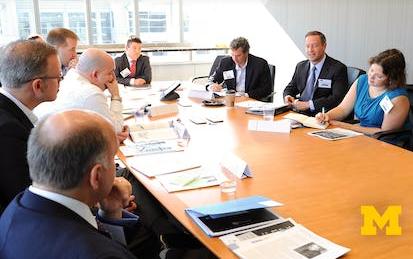

Our Courses

Introduction to Data Analysis Using Excel
The use of Excel is widespread in the industry. It is a very powerful data analysis tool and almost all big and small businesses use Excel in their day to day functioning. This is an introductory course in the use of Excel and is designed to give you a working knowledge of Excel with the aim of getting to use it for more advance topics in Business Statistics later. The course is designed keeping in mind two kinds of learners - those who have very little functional knowledge of Excel and those who use Excel regularly but at a peripheral level and wish to enhance their skills.
-
Course by

-
 Self Paced
Self Paced
-
 24 hours
24 hours
-
 English
English

Managing Employee Performance
Once you have hired good employees, the next step that successful people managers take is to develop the full potential of their employees. Performance management is a process that helps managers achieve the goal of getting the best from their employees. In this third course in the Human Resources for People Managers specialization, we will discuss the skills and key processes you will need to develop your employees to attain department and organizational goals.
-
Course by

-
 Self Paced
Self Paced
-
 15 hours
15 hours
-
 English
English

Text Mining and Analytics
This course will cover the major techniques for mining and analyzing text data to discover interesting patterns, extract useful knowledge, and support decision making, with an emphasis on statistical approaches that can be generally applied to arbitrary text data in any natural language with no or minimum human effort. Detailed analysis of text data requires understanding of natural language text, which is known to be a difficult task for computers.
-
Course by

-
 Self Paced
Self Paced
-
 33 hours
33 hours
-
 English
English

Digital Competition in Financial Services
Welcome to Digital Transformation Strategy! As you probably know, this is the first course in a three part specialization focused on the digital transformation of finance. We'll aim to bring you insights about how digitalization intersects with finance, culled from one of the world's top regions for digital innovation. I'm excited to have you in the class and look forward to helping you learn more about this important topic. To begin, I recommend taking a few minutes to explore the course site. A good place to start is the navigation bar on the left.
-
Course by

-
 Self Paced
Self Paced
-
 12 hours
12 hours
-
 English
English

Engineering Project Management: Scope, Time and Cost Management
Scope, time, and cost management are at the heart of successful project management. This course will give you the tools to develop a project scope, schedule and budget and then status them to predict project performance. Throughout the course, you will learn about change management and techniques to implement it.
-
Course by

-
 Self Paced
Self Paced
-
 23 hours
23 hours
-
 English
English

Tricky English Grammar
English is a difficult language to learn because of its many obscure grammatical rules, which are fairly easy to mess up--even for native speakers. While it’s easy for non-native speakers to get overwhelmed by confusing grammar rules, in this course, we'll provide you with tips that will help you understand the rules more easily and give you lots of practice with the tricky grammar of everyday English. Please note that the free version of this class gives you access to all of the instructional videos and handouts. The peer feedback and quizzes are only available in the paid version.
-
Course by

-
 Self Paced
Self Paced
-
 25 hours
25 hours
-
 English
English

Enterprise System Management and Security
The world runs on computers. Your watch, your TV, your car. You might be familiar on how to operate each of these. Your home computer you are even more familiar with operating it. But what does it take to really take computer systems to the next level? - The enterprise level. In this course we discuss what makes home computing systems different from enterprise computing systems.
-
Course by

-
 Self Paced
Self Paced
-
 12 hours
12 hours
-
 English
English

Introduction to Data, Signal, and Image Analysis with MATLAB
Welcome to Introduction to Data, Signal, and Image Analysis with MATLAB! MATLAB is an extremely versatile programming language for data, signal, and image analysis tasks. This course provides an introduction on how to use MATLAB for data, signal, and image analysis.
-
Course by

-
 Self Paced
Self Paced
-
 23 hours
23 hours
-
 English
English

Machine Learning Foundations: A Case Study Approach
Do you have data and wonder what it can tell you? Do you need a deeper understanding of the core ways in which machine learning can improve your business? Do you want to be able to converse with specialists about anything from regression and classification to deep learning and recommender systems? In this course, you will get hands-on experience with machine learning from a series of practical case-studies.
-
Course by

-
 18 hours
18 hours
-
 English
English

Construction Project Management
Construction Project Management introduces learners to Project Initiation and Planning. Columbia University professor, Ibrahim Odeh, along with industry experts join together to provide a comprehensive overview of the construction industry. There are 10 modules that allow learners to become knowledgeable of construction management within the dynamic construction industry. Professor Odeh teaches learners about the fundamentals of the Project Development Cycle while guest lecturers discuss Lean Project Delivery method and Lean Design Behaviors.
-
Course by

-
 Self Paced
Self Paced
-
 27 hours
27 hours
-
 English
English

Introduction to Meteor.js Development
In this course, you will learn how to create a complete, multi-user web site using the Meteor.js framework and MongoDB. You will implement user authentication, security features, reactive templates and routing using iron router. You will carry out key database operations such as inserting, removing and updating data as well as sorting and filtering. You will see how a complete application can be built, line by line. At the end of the course, you will be able to: 1. Install the Meteor.js system and create a web application 2. Work with the Meteor.js packaging system 3.
-
Course by

-
 Self Paced
Self Paced
-
 26 hours
26 hours
-
 English
English
Entrepreneurship II: Preparing for Launch
This course builds on previous concepts and outlines strategies and tactics for forming, financing, and launching a new venture. Topics to be addressed will include building the new venture’s initial management team, identifying and reaching out to early customers, developing financial plans, raising startup and initial growth financing, and preparing for and managing rapid growth.
-
Course by

-
 Self Paced
Self Paced
-
 17 hours
17 hours
-
 English
English

Supply Chain Operations
Have you ever wondered how products and services are created exactly the same thousands of times over? And how companies are able to smooth out operations to manufacture efficiently, effectively, and without any waste? How is such precision possible? The answer lies at the heart of operations. In the Supply Chain Operations course, we introduce and apply essential process improvement tools to achieve perfection. After completing this course, you will be able to apply the Six Sigma methodology for process improvement.
-
Course by

-
 Self Paced
Self Paced
-
 12 hours
12 hours
-
 English
English

Business English: Making Presentations
This course teaches you language and techniques that will help you make effective presentations in English. The final task is to develop a well-organized, persuasive presentation using charts and graphs that sells your city as a venue. The course focuses on students who have an intermediate level of English, with a minimum of two years of formal language study. Course Learning Objectives • Present information in an organized and engaging way • Share data in charts and graphs • Use persuasive language in a presentation
-
Course by

-
 Self Paced
Self Paced
-
 15 hours
15 hours
-
 English
English
3D Printing Software
This course will demonstrate how to use 3D printing software to create digital designs that can be turned into physical objects. It will also demonstrate how 3D scanners work to turn physical objects into digital designs. This course is hands-on in nature and will provide step-by-step instructions to guide you through two popular 3D modeling programs, Tinkercad and Fusion 360. Learners who complete this course will be able to use 3D software to design a wide variety of objects for both personal and professional use.
-
Course by

-
 Self Paced
Self Paced
-
 15 hours
15 hours
-
 English
English

Inspiring and Motivating Individuals
In this course, you will learn how to create a shared vision for your team and effectively communicate it to your teammates. You will also learn how to set effective goals and expectations in a way that best enables your team to attain the shared vision. Finally, you will understand the most important needs and drivers of performance across cultures, and will learn to align rewards with desired behaviors so that your teammates are motivated to attain the team’s objectives.
-
Course by

-
 Self Paced
Self Paced
-
 14 hours
14 hours
-
 English
English

Managing Talent
In this course, you will learn best practices for selecting, recruiting, and onboarding talent. You will also learn about the key approaches to measuring performance and evaluating your employees. In addition, you will learn how to develop and coach your talent so that they can realize their full potential at work. Altogether, you will gain a thorough understanding of the complete cycle of managing talent and creating a robust talent pipeline for your team and organization. Managing and developing talent is one of the top 3 issues on the minds of CEOs from around the world.
-
Course by

-
 Self Paced
Self Paced
-
 13 hours
13 hours
-
 English
English

Leading Teams
In this course, you will learn how to build your team, improve teamwork and collaboration, and sustain team performance through continuous learning and improvement. Specifically, you will learn best practices for composing a team and aligning individual and team goals. You will also learn how to establish roles, build structures, and manage decision making so that your team excels. This course will also help you manage critical team processes such as conflict resolution and building trust that have a profound impact on your team’s performance.
-
Course by

-
 Self Paced
Self Paced
-
 11 hours
11 hours
-
 English
English

Influencing People
This course will improve your ability to influence people in situations where you cannot use formal authority. You will learn about effective ways to build, develop, and sustain a power base in your organization. You will also learn influence tactics that enable you to be more persuasive and influential in working with your superiors, peers, and even subordinates. In addition, you will learn how to build and maintain high-quality relationships to further maximize your informal power and ability to influence others.
-
Course by

-
 Self Paced
Self Paced
-
 11 hours
11 hours
-
 English
English

Programming Foundations with JavaScript, HTML and CSS
Learn foundational programming concepts (e.g., functions, for loops, conditional statements) and how to solve problems like a programmer. In addition, learn basic web development as you build web pages using HTML, CSS, JavaScript. By the end of the course, will create a web page where others can upload their images and apply image filters that you create. After completing this course, you will be able to: 1. Think critically about how to solve a problem using programming; 2. Write JavaScript programs using functions, for loops, and conditional statements; 3.
-
Course by

-
 Self Paced
Self Paced
-
 33 hours
33 hours
-
 English
English

Corporate Finance I: Measuring and Promoting Value Creation
In this course you will learn how to use key finance principles to understand and measure business success and to identify and promote true value creation. You will learn how to use accounting information to form key financial ratios to measure a company’s financial health and to manage a company's short-term and long-term liquidity needs. You will also learn how to use valuation techniques to make sound business investment and acquisition decisions.
-
Course by

-
 Self Paced
Self Paced
-
 24 hours
24 hours
-
 English
English

Hardware Description Languages for FPGA Design
This course can also be taken for academic credit as ECEA 5361, part of CU Boulder’s Master of Science in Electrical Engineering degree. Hardware Description Languages for Logic Design enables students to design circuits using VHDL and Verilog, the most widespread design methods for FPGA Design. It uses natural learning processes to make learning the languages easy. Simple first examples are presented, then language rules and syntax, followed by more complex examples, and then finally use of test bench simulations to verify correctness of the designs.
-
Course by

-
 Self Paced
Self Paced
-
 36 hours
36 hours
-
 English
English
Software Product Management Capstone
In this six-week capstone course, you will gain practical management experience in a safe, simulated software production setting. You will apply Agile practices and techniques to conquer industry-inspired challenges. Interacting with a realistic client, you will discern what they want and express what they truly need in software requirements to drive software production. Upon completing the capstone, you will be prepared to advance your career as a confident software product management professional.
-
Course by

-
 19 hours
19 hours
-
 English
English
Getting Started with SAS Visual Analytics
In this course, you learn more about SAS Visual Analytics and the SAS Viya platform, how to access and investigate data in SAS Visual Analytics, and how to prepare data for analysis using SAS Data Studio.
-
Course by

-
 Self Paced
Self Paced
-
 5 hours
5 hours
-
 English
English

Statistical Inference and Hypothesis Testing in Data Science Applications
This course will focus on theory and implementation of hypothesis testing, especially as it relates to applications in data science. Students will learn to use hypothesis tests to make informed decisions from data. Special attention will be given to the general logic of hypothesis testing, error and error rates, power, simulation, and the correct computation and interpretation of p-values.
-
Course by

-
 Self Paced
Self Paced
-
 37 hours
37 hours
-
 English
English



